Business Ethics Report: Analysis of Media Articles, Trimester 3, 2019
VerifiedAdded on 2022/08/29
|22
|3766
|24
Report
AI Summary
This report provides a comprehensive analysis of two media articles focusing on business ethics. The first article examines the ethical concerns within the beauty industry, particularly the exploitation of child labor in mica mining and the lack of fair wages for workers, alongside the use of unethical sourcing practices. It identifies key stakeholders such as children, families, customers, and beauty brands, and recommends increased transparency in supply chains. The second article addresses ethical issues at Google, specifically the firing of employee activists and the company's alleged targeting of vulnerable employees. It highlights the ethical implications of these actions, emphasizing the importance of employee rights and government oversight. The report explores ethical issues, stakeholders, and recommendations for both the beauty and tech industries.
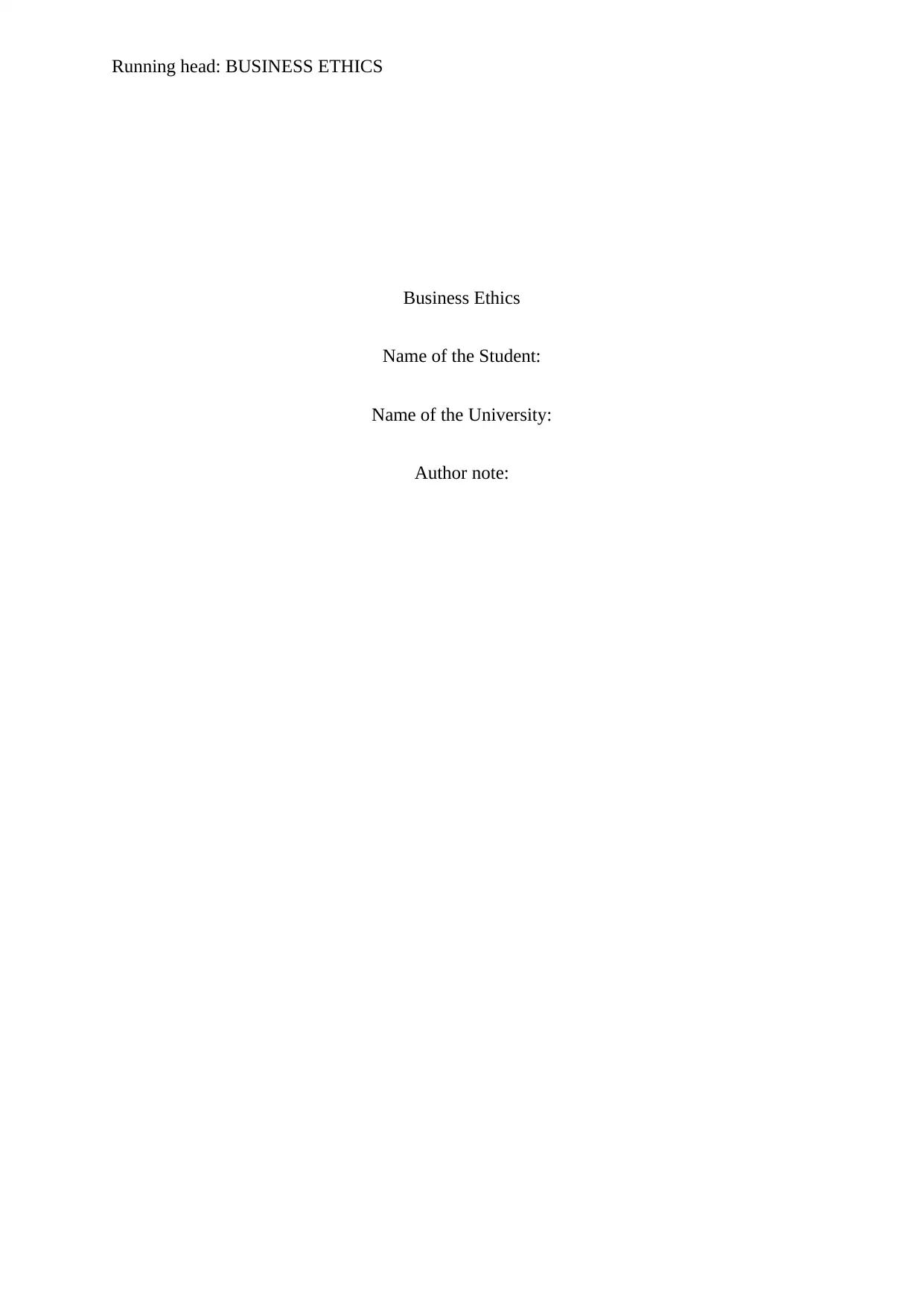
Running head: BUSINESS ETHICS
Business Ethics
Name of the Student:
Name of the University:
Author note:
Business Ethics
Name of the Student:
Name of the University:
Author note:
Paraphrase This Document
Need a fresh take? Get an instant paraphrase of this document with our AI Paraphraser
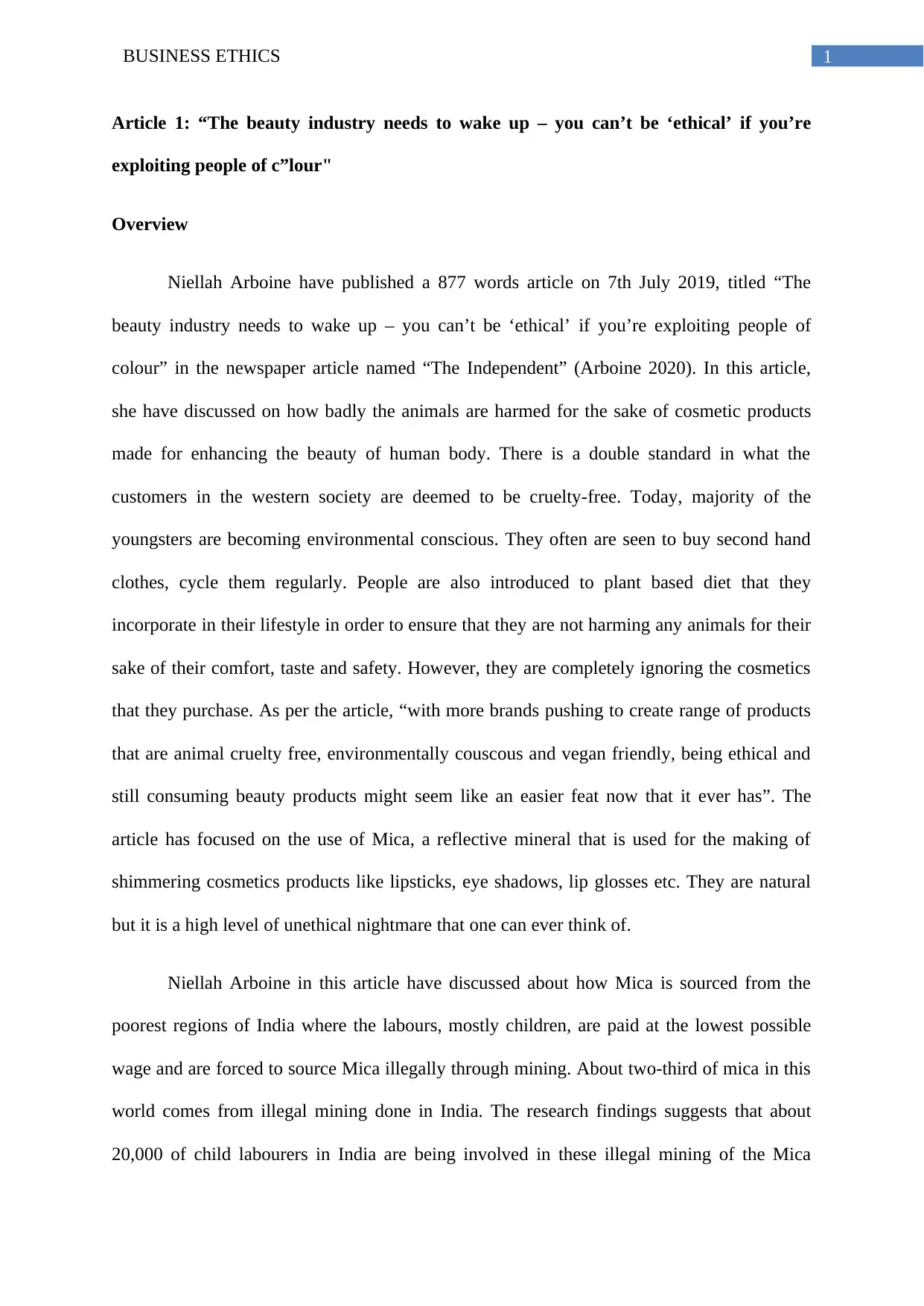
1BUSINESS ETHICS
Article 1: “The beauty industry needs to wake up – you can’t be ‘ethical’ if you’re
exploiting people of c”lour"
Overview
Niellah Arboine have published a 877 words article on 7th July 2019, titled “The
beauty industry needs to wake up – you can’t be ‘ethical’ if you’re exploiting people of
colour” in the newspaper article named “The Independent” (Arboine 2020). In this article,
she have discussed on how badly the animals are harmed for the sake of cosmetic products
made for enhancing the beauty of human body. There is a double standard in what the
customers in the western society are deemed to be cruelty-free. Today, majority of the
youngsters are becoming environmental conscious. They often are seen to buy second hand
clothes, cycle them regularly. People are also introduced to plant based diet that they
incorporate in their lifestyle in order to ensure that they are not harming any animals for their
sake of their comfort, taste and safety. However, they are completely ignoring the cosmetics
that they purchase. As per the article, “with more brands pushing to create range of products
that are animal cruelty free, environmentally couscous and vegan friendly, being ethical and
still consuming beauty products might seem like an easier feat now that it ever has”. The
article has focused on the use of Mica, a reflective mineral that is used for the making of
shimmering cosmetics products like lipsticks, eye shadows, lip glosses etc. They are natural
but it is a high level of unethical nightmare that one can ever think of.
Niellah Arboine in this article have discussed about how Mica is sourced from the
poorest regions of India where the labours, mostly children, are paid at the lowest possible
wage and are forced to source Mica illegally through mining. About two-third of mica in this
world comes from illegal mining done in India. The research findings suggests that about
20,000 of child labourers in India are being involved in these illegal mining of the Mica
Article 1: “The beauty industry needs to wake up – you can’t be ‘ethical’ if you’re
exploiting people of c”lour"
Overview
Niellah Arboine have published a 877 words article on 7th July 2019, titled “The
beauty industry needs to wake up – you can’t be ‘ethical’ if you’re exploiting people of
colour” in the newspaper article named “The Independent” (Arboine 2020). In this article,
she have discussed on how badly the animals are harmed for the sake of cosmetic products
made for enhancing the beauty of human body. There is a double standard in what the
customers in the western society are deemed to be cruelty-free. Today, majority of the
youngsters are becoming environmental conscious. They often are seen to buy second hand
clothes, cycle them regularly. People are also introduced to plant based diet that they
incorporate in their lifestyle in order to ensure that they are not harming any animals for their
sake of their comfort, taste and safety. However, they are completely ignoring the cosmetics
that they purchase. As per the article, “with more brands pushing to create range of products
that are animal cruelty free, environmentally couscous and vegan friendly, being ethical and
still consuming beauty products might seem like an easier feat now that it ever has”. The
article has focused on the use of Mica, a reflective mineral that is used for the making of
shimmering cosmetics products like lipsticks, eye shadows, lip glosses etc. They are natural
but it is a high level of unethical nightmare that one can ever think of.
Niellah Arboine in this article have discussed about how Mica is sourced from the
poorest regions of India where the labours, mostly children, are paid at the lowest possible
wage and are forced to source Mica illegally through mining. About two-third of mica in this
world comes from illegal mining done in India. The research findings suggests that about
20,000 of child labourers in India are being involved in these illegal mining of the Mica
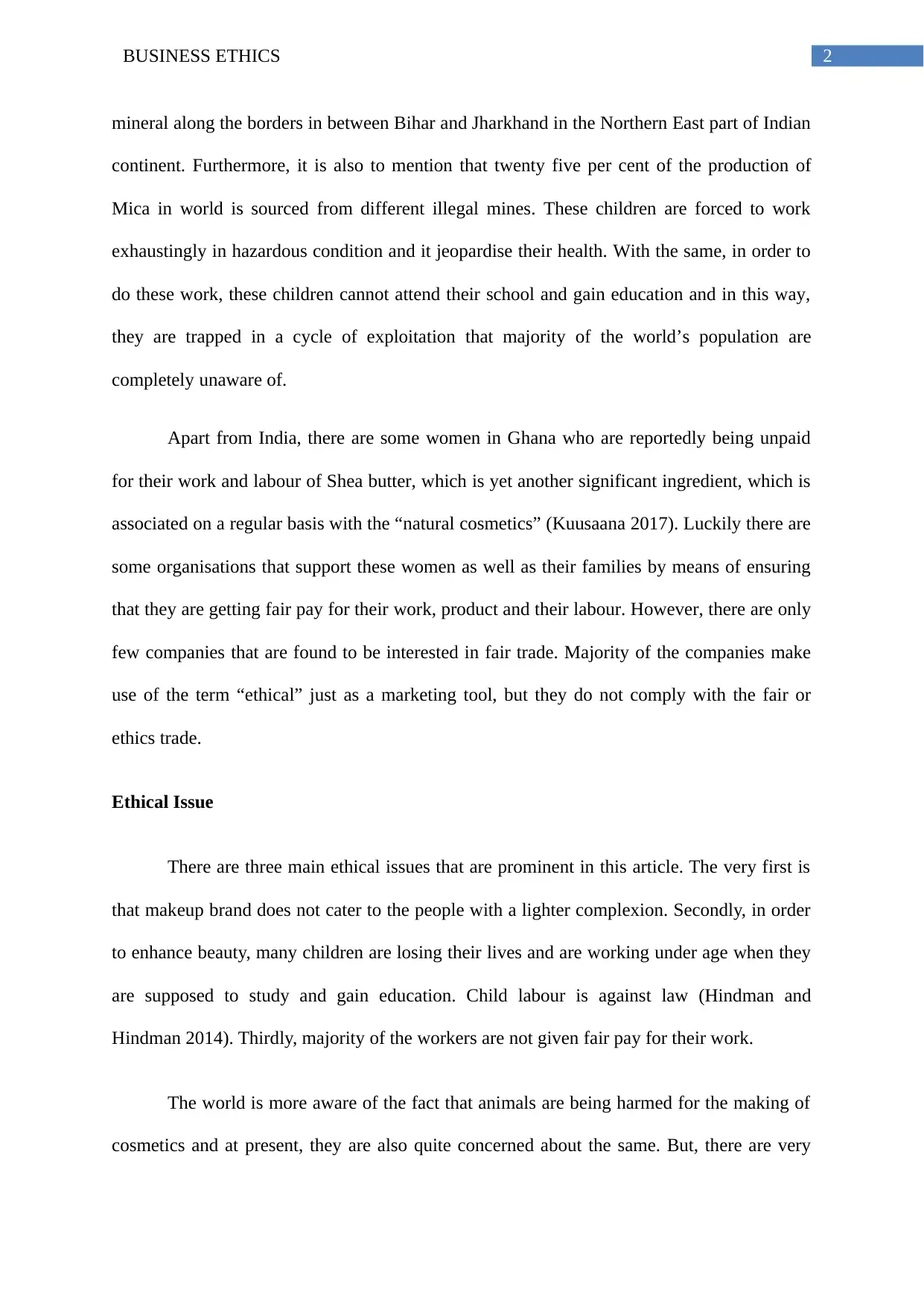
2BUSINESS ETHICS
mineral along the borders in between Bihar and Jharkhand in the Northern East part of Indian
continent. Furthermore, it is also to mention that twenty five per cent of the production of
Mica in world is sourced from different illegal mines. These children are forced to work
exhaustingly in hazardous condition and it jeopardise their health. With the same, in order to
do these work, these children cannot attend their school and gain education and in this way,
they are trapped in a cycle of exploitation that majority of the world’s population are
completely unaware of.
Apart from India, there are some women in Ghana who are reportedly being unpaid
for their work and labour of Shea butter, which is yet another significant ingredient, which is
associated on a regular basis with the “natural cosmetics” (Kuusaana 2017). Luckily there are
some organisations that support these women as well as their families by means of ensuring
that they are getting fair pay for their work, product and their labour. However, there are only
few companies that are found to be interested in fair trade. Majority of the companies make
use of the term “ethical” just as a marketing tool, but they do not comply with the fair or
ethics trade.
Ethical Issue
There are three main ethical issues that are prominent in this article. The very first is
that makeup brand does not cater to the people with a lighter complexion. Secondly, in order
to enhance beauty, many children are losing their lives and are working under age when they
are supposed to study and gain education. Child labour is against law (Hindman and
Hindman 2014). Thirdly, majority of the workers are not given fair pay for their work.
The world is more aware of the fact that animals are being harmed for the making of
cosmetics and at present, they are also quite concerned about the same. But, there are very
mineral along the borders in between Bihar and Jharkhand in the Northern East part of Indian
continent. Furthermore, it is also to mention that twenty five per cent of the production of
Mica in world is sourced from different illegal mines. These children are forced to work
exhaustingly in hazardous condition and it jeopardise their health. With the same, in order to
do these work, these children cannot attend their school and gain education and in this way,
they are trapped in a cycle of exploitation that majority of the world’s population are
completely unaware of.
Apart from India, there are some women in Ghana who are reportedly being unpaid
for their work and labour of Shea butter, which is yet another significant ingredient, which is
associated on a regular basis with the “natural cosmetics” (Kuusaana 2017). Luckily there are
some organisations that support these women as well as their families by means of ensuring
that they are getting fair pay for their work, product and their labour. However, there are only
few companies that are found to be interested in fair trade. Majority of the companies make
use of the term “ethical” just as a marketing tool, but they do not comply with the fair or
ethics trade.
Ethical Issue
There are three main ethical issues that are prominent in this article. The very first is
that makeup brand does not cater to the people with a lighter complexion. Secondly, in order
to enhance beauty, many children are losing their lives and are working under age when they
are supposed to study and gain education. Child labour is against law (Hindman and
Hindman 2014). Thirdly, majority of the workers are not given fair pay for their work.
The world is more aware of the fact that animals are being harmed for the making of
cosmetics and at present, they are also quite concerned about the same. But, there are very
⊘ This is a preview!⊘
Do you want full access?
Subscribe today to unlock all pages.

Trusted by 1+ million students worldwide
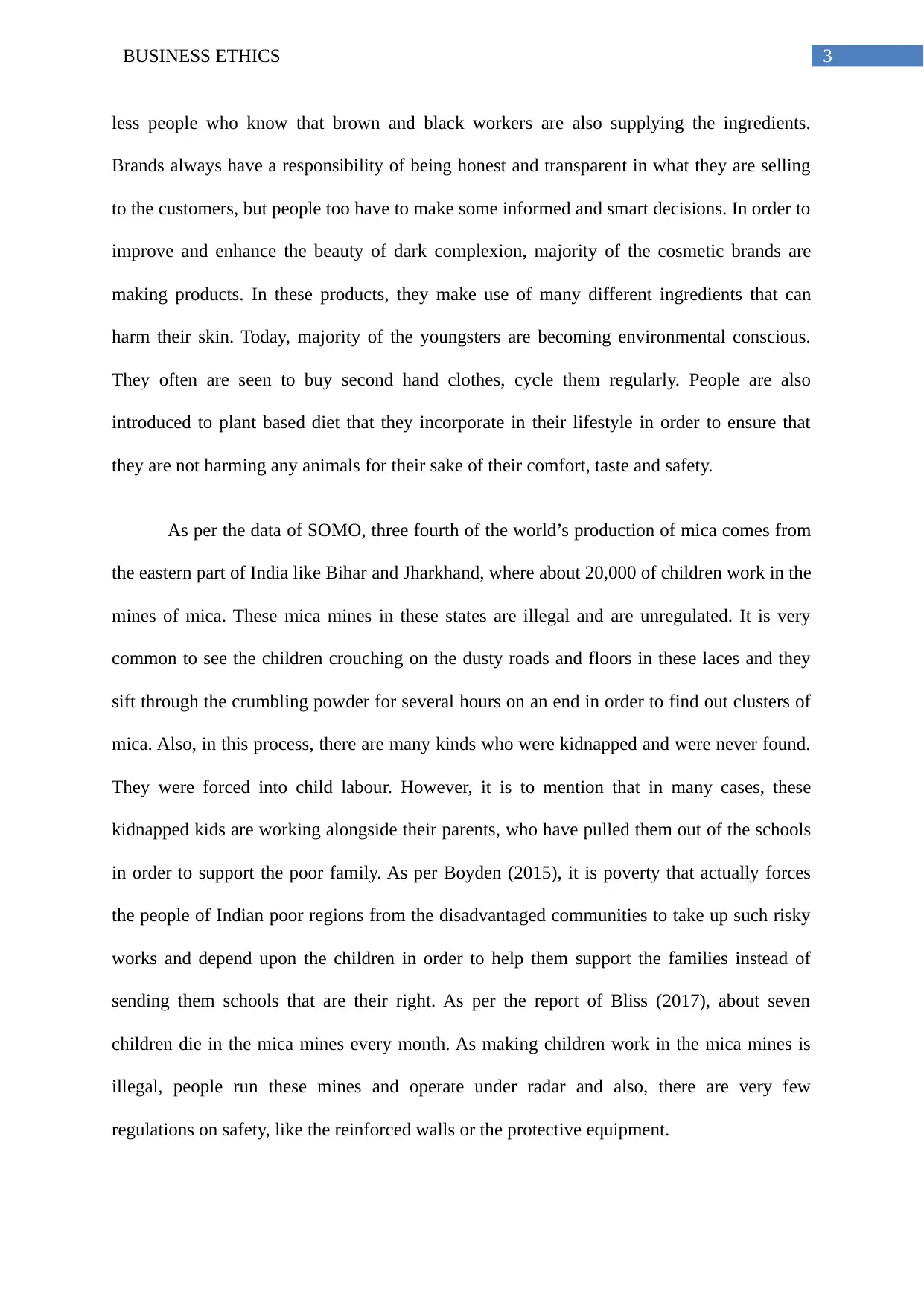
3BUSINESS ETHICS
less people who know that brown and black workers are also supplying the ingredients.
Brands always have a responsibility of being honest and transparent in what they are selling
to the customers, but people too have to make some informed and smart decisions. In order to
improve and enhance the beauty of dark complexion, majority of the cosmetic brands are
making products. In these products, they make use of many different ingredients that can
harm their skin. Today, majority of the youngsters are becoming environmental conscious.
They often are seen to buy second hand clothes, cycle them regularly. People are also
introduced to plant based diet that they incorporate in their lifestyle in order to ensure that
they are not harming any animals for their sake of their comfort, taste and safety.
As per the data of SOMO, three fourth of the world’s production of mica comes from
the eastern part of India like Bihar and Jharkhand, where about 20,000 of children work in the
mines of mica. These mica mines in these states are illegal and are unregulated. It is very
common to see the children crouching on the dusty roads and floors in these laces and they
sift through the crumbling powder for several hours on an end in order to find out clusters of
mica. Also, in this process, there are many kinds who were kidnapped and were never found.
They were forced into child labour. However, it is to mention that in many cases, these
kidnapped kids are working alongside their parents, who have pulled them out of the schools
in order to support the poor family. As per Boyden (2015), it is poverty that actually forces
the people of Indian poor regions from the disadvantaged communities to take up such risky
works and depend upon the children in order to help them support the families instead of
sending them schools that are their right. As per the report of Bliss (2017), about seven
children die in the mica mines every month. As making children work in the mica mines is
illegal, people run these mines and operate under radar and also, there are very few
regulations on safety, like the reinforced walls or the protective equipment.
less people who know that brown and black workers are also supplying the ingredients.
Brands always have a responsibility of being honest and transparent in what they are selling
to the customers, but people too have to make some informed and smart decisions. In order to
improve and enhance the beauty of dark complexion, majority of the cosmetic brands are
making products. In these products, they make use of many different ingredients that can
harm their skin. Today, majority of the youngsters are becoming environmental conscious.
They often are seen to buy second hand clothes, cycle them regularly. People are also
introduced to plant based diet that they incorporate in their lifestyle in order to ensure that
they are not harming any animals for their sake of their comfort, taste and safety.
As per the data of SOMO, three fourth of the world’s production of mica comes from
the eastern part of India like Bihar and Jharkhand, where about 20,000 of children work in the
mines of mica. These mica mines in these states are illegal and are unregulated. It is very
common to see the children crouching on the dusty roads and floors in these laces and they
sift through the crumbling powder for several hours on an end in order to find out clusters of
mica. Also, in this process, there are many kinds who were kidnapped and were never found.
They were forced into child labour. However, it is to mention that in many cases, these
kidnapped kids are working alongside their parents, who have pulled them out of the schools
in order to support the poor family. As per Boyden (2015), it is poverty that actually forces
the people of Indian poor regions from the disadvantaged communities to take up such risky
works and depend upon the children in order to help them support the families instead of
sending them schools that are their right. As per the report of Bliss (2017), about seven
children die in the mica mines every month. As making children work in the mica mines is
illegal, people run these mines and operate under radar and also, there are very few
regulations on safety, like the reinforced walls or the protective equipment.
Paraphrase This Document
Need a fresh take? Get an instant paraphrase of this document with our AI Paraphraser
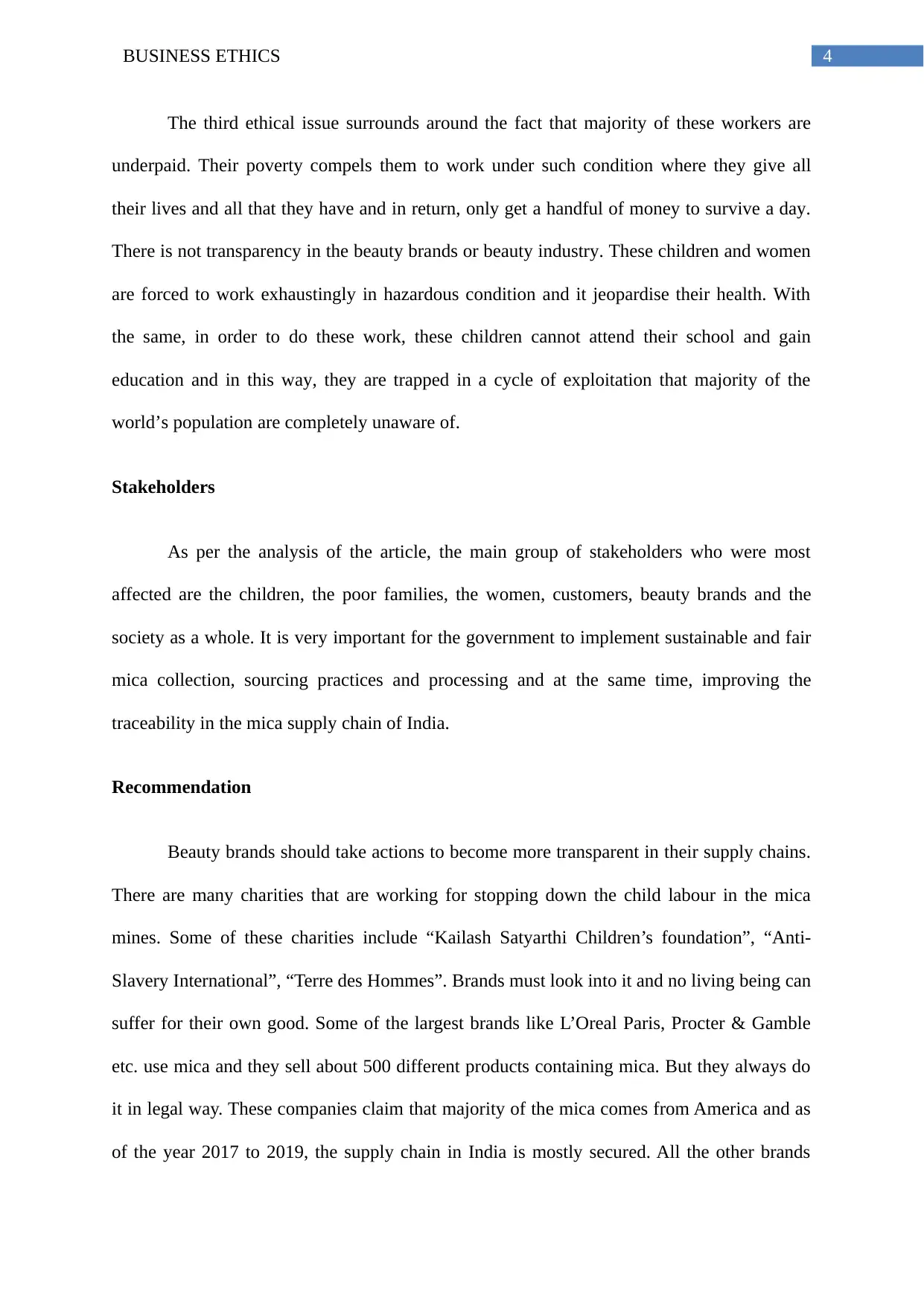
4BUSINESS ETHICS
The third ethical issue surrounds around the fact that majority of these workers are
underpaid. Their poverty compels them to work under such condition where they give all
their lives and all that they have and in return, only get a handful of money to survive a day.
There is not transparency in the beauty brands or beauty industry. These children and women
are forced to work exhaustingly in hazardous condition and it jeopardise their health. With
the same, in order to do these work, these children cannot attend their school and gain
education and in this way, they are trapped in a cycle of exploitation that majority of the
world’s population are completely unaware of.
Stakeholders
As per the analysis of the article, the main group of stakeholders who were most
affected are the children, the poor families, the women, customers, beauty brands and the
society as a whole. It is very important for the government to implement sustainable and fair
mica collection, sourcing practices and processing and at the same time, improving the
traceability in the mica supply chain of India.
Recommendation
Beauty brands should take actions to become more transparent in their supply chains.
There are many charities that are working for stopping down the child labour in the mica
mines. Some of these charities include “Kailash Satyarthi Children’s foundation”, “Anti-
Slavery International”, “Terre des Hommes”. Brands must look into it and no living being can
suffer for their own good. Some of the largest brands like L’Oreal Paris, Procter & Gamble
etc. use mica and they sell about 500 different products containing mica. But they always do
it in legal way. These companies claim that majority of the mica comes from America and as
of the year 2017 to 2019, the supply chain in India is mostly secured. All the other brands
The third ethical issue surrounds around the fact that majority of these workers are
underpaid. Their poverty compels them to work under such condition where they give all
their lives and all that they have and in return, only get a handful of money to survive a day.
There is not transparency in the beauty brands or beauty industry. These children and women
are forced to work exhaustingly in hazardous condition and it jeopardise their health. With
the same, in order to do these work, these children cannot attend their school and gain
education and in this way, they are trapped in a cycle of exploitation that majority of the
world’s population are completely unaware of.
Stakeholders
As per the analysis of the article, the main group of stakeholders who were most
affected are the children, the poor families, the women, customers, beauty brands and the
society as a whole. It is very important for the government to implement sustainable and fair
mica collection, sourcing practices and processing and at the same time, improving the
traceability in the mica supply chain of India.
Recommendation
Beauty brands should take actions to become more transparent in their supply chains.
There are many charities that are working for stopping down the child labour in the mica
mines. Some of these charities include “Kailash Satyarthi Children’s foundation”, “Anti-
Slavery International”, “Terre des Hommes”. Brands must look into it and no living being can
suffer for their own good. Some of the largest brands like L’Oreal Paris, Procter & Gamble
etc. use mica and they sell about 500 different products containing mica. But they always do
it in legal way. These companies claim that majority of the mica comes from America and as
of the year 2017 to 2019, the supply chain in India is mostly secured. All the other brands
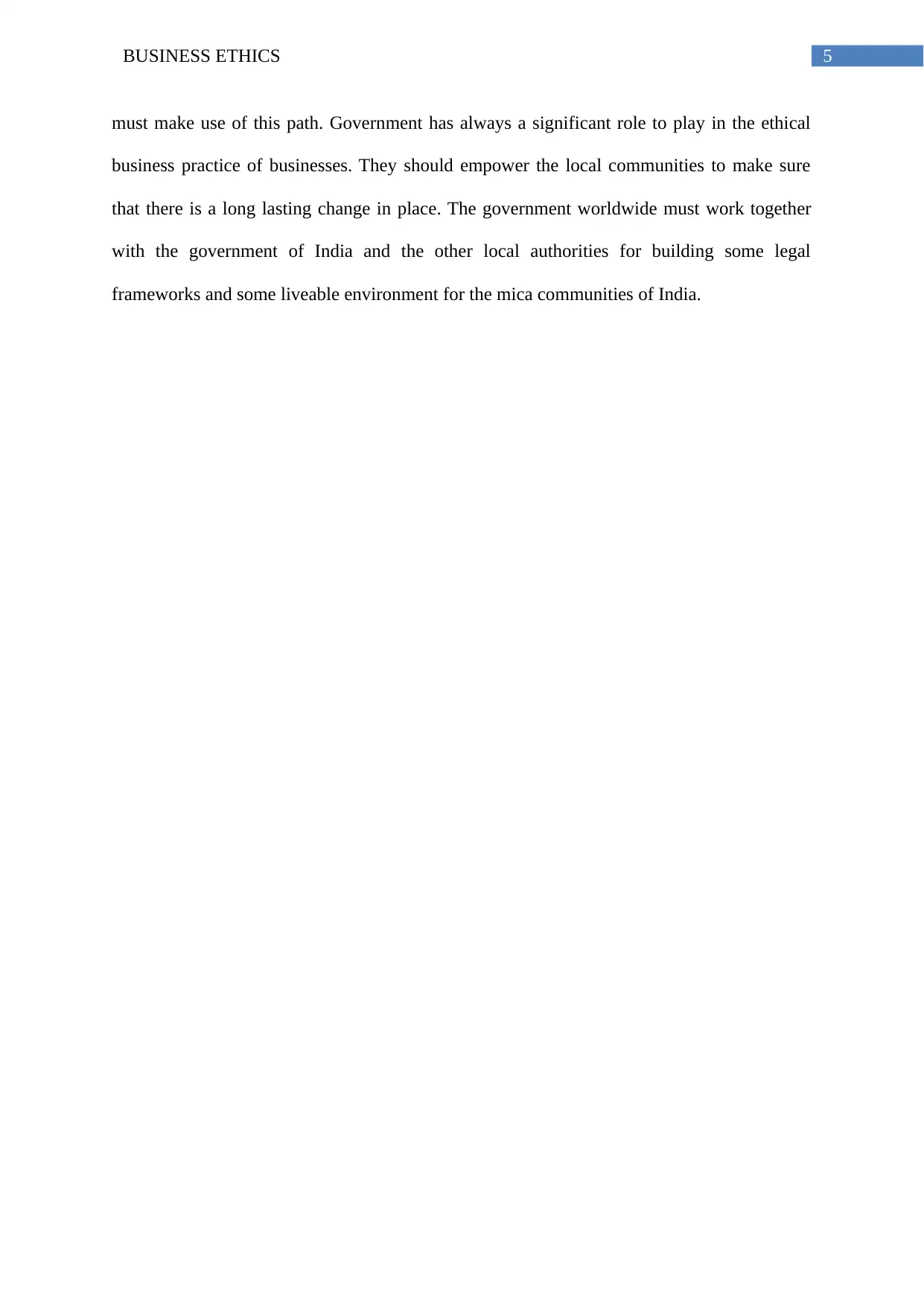
5BUSINESS ETHICS
must make use of this path. Government has always a significant role to play in the ethical
business practice of businesses. They should empower the local communities to make sure
that there is a long lasting change in place. The government worldwide must work together
with the government of India and the other local authorities for building some legal
frameworks and some liveable environment for the mica communities of India.
must make use of this path. Government has always a significant role to play in the ethical
business practice of businesses. They should empower the local communities to make sure
that there is a long lasting change in place. The government worldwide must work together
with the government of India and the other local authorities for building some legal
frameworks and some liveable environment for the mica communities of India.
⊘ This is a preview!⊘
Do you want full access?
Subscribe today to unlock all pages.

Trusted by 1+ million students worldwide
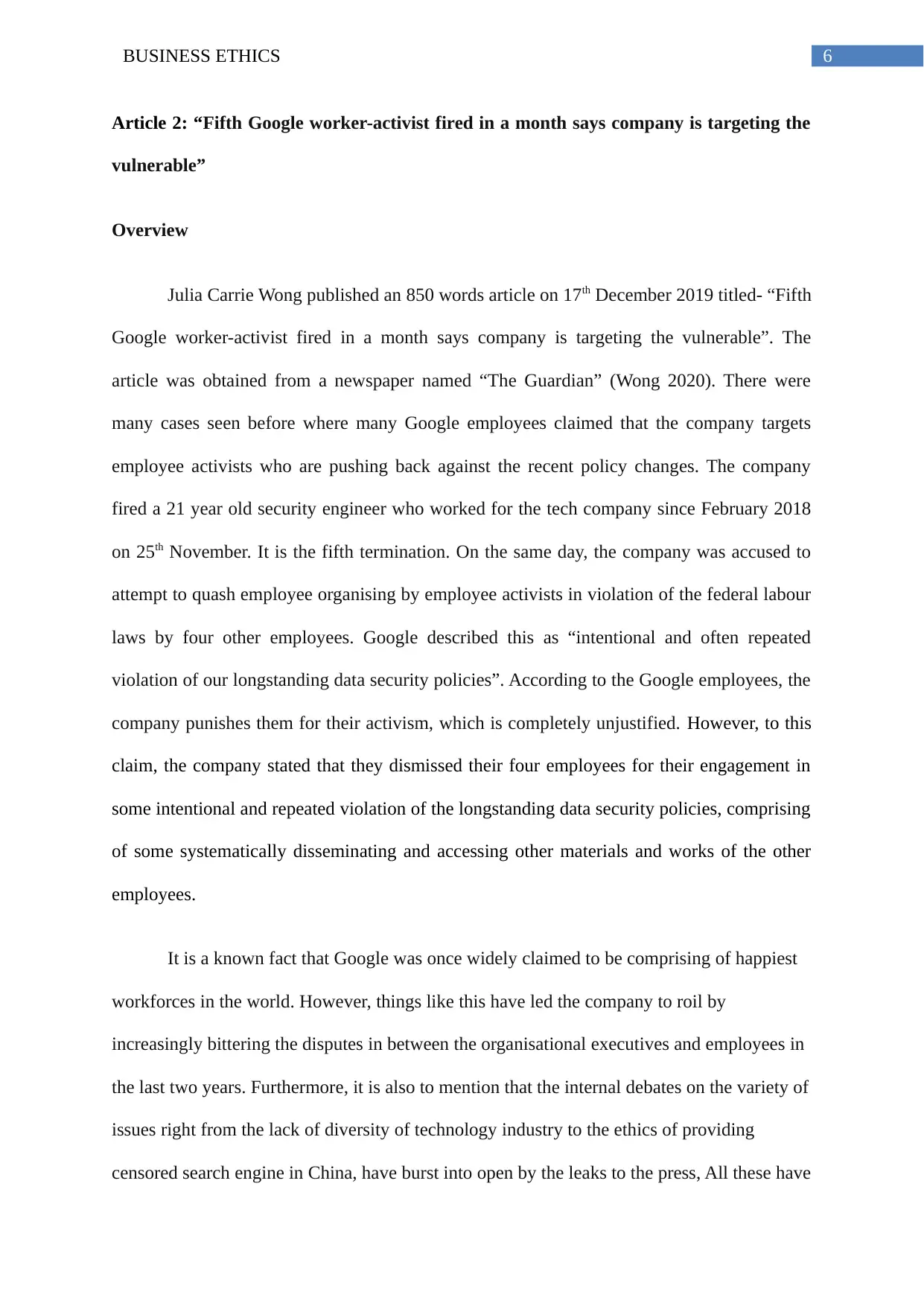
6BUSINESS ETHICS
Article 2: “Fifth Google worker-activist fired in a month says company is targeting the
vulnerable”
Overview
Julia Carrie Wong published an 850 words article on 17th December 2019 titled- “Fifth
Google worker-activist fired in a month says company is targeting the vulnerable”. The
article was obtained from a newspaper named “The Guardian” (Wong 2020). There were
many cases seen before where many Google employees claimed that the company targets
employee activists who are pushing back against the recent policy changes. The company
fired a 21 year old security engineer who worked for the tech company since February 2018
on 25th November. It is the fifth termination. On the same day, the company was accused to
attempt to quash employee organising by employee activists in violation of the federal labour
laws by four other employees. Google described this as “intentional and often repeated
violation of our longstanding data security policies”. According to the Google employees, the
company punishes them for their activism, which is completely unjustified. However, to this
claim, the company stated that they dismissed their four employees for their engagement in
some intentional and repeated violation of the longstanding data security policies, comprising
of some systematically disseminating and accessing other materials and works of the other
employees.
It is a known fact that Google was once widely claimed to be comprising of happiest
workforces in the world. However, things like this have led the company to roil by
increasingly bittering the disputes in between the organisational executives and employees in
the last two years. Furthermore, it is also to mention that the internal debates on the variety of
issues right from the lack of diversity of technology industry to the ethics of providing
censored search engine in China, have burst into open by the leaks to the press, All these have
Article 2: “Fifth Google worker-activist fired in a month says company is targeting the
vulnerable”
Overview
Julia Carrie Wong published an 850 words article on 17th December 2019 titled- “Fifth
Google worker-activist fired in a month says company is targeting the vulnerable”. The
article was obtained from a newspaper named “The Guardian” (Wong 2020). There were
many cases seen before where many Google employees claimed that the company targets
employee activists who are pushing back against the recent policy changes. The company
fired a 21 year old security engineer who worked for the tech company since February 2018
on 25th November. It is the fifth termination. On the same day, the company was accused to
attempt to quash employee organising by employee activists in violation of the federal labour
laws by four other employees. Google described this as “intentional and often repeated
violation of our longstanding data security policies”. According to the Google employees, the
company punishes them for their activism, which is completely unjustified. However, to this
claim, the company stated that they dismissed their four employees for their engagement in
some intentional and repeated violation of the longstanding data security policies, comprising
of some systematically disseminating and accessing other materials and works of the other
employees.
It is a known fact that Google was once widely claimed to be comprising of happiest
workforces in the world. However, things like this have led the company to roil by
increasingly bittering the disputes in between the organisational executives and employees in
the last two years. Furthermore, it is also to mention that the internal debates on the variety of
issues right from the lack of diversity of technology industry to the ethics of providing
censored search engine in China, have burst into open by the leaks to the press, All these have
Paraphrase This Document
Need a fresh take? Get an instant paraphrase of this document with our AI Paraphraser
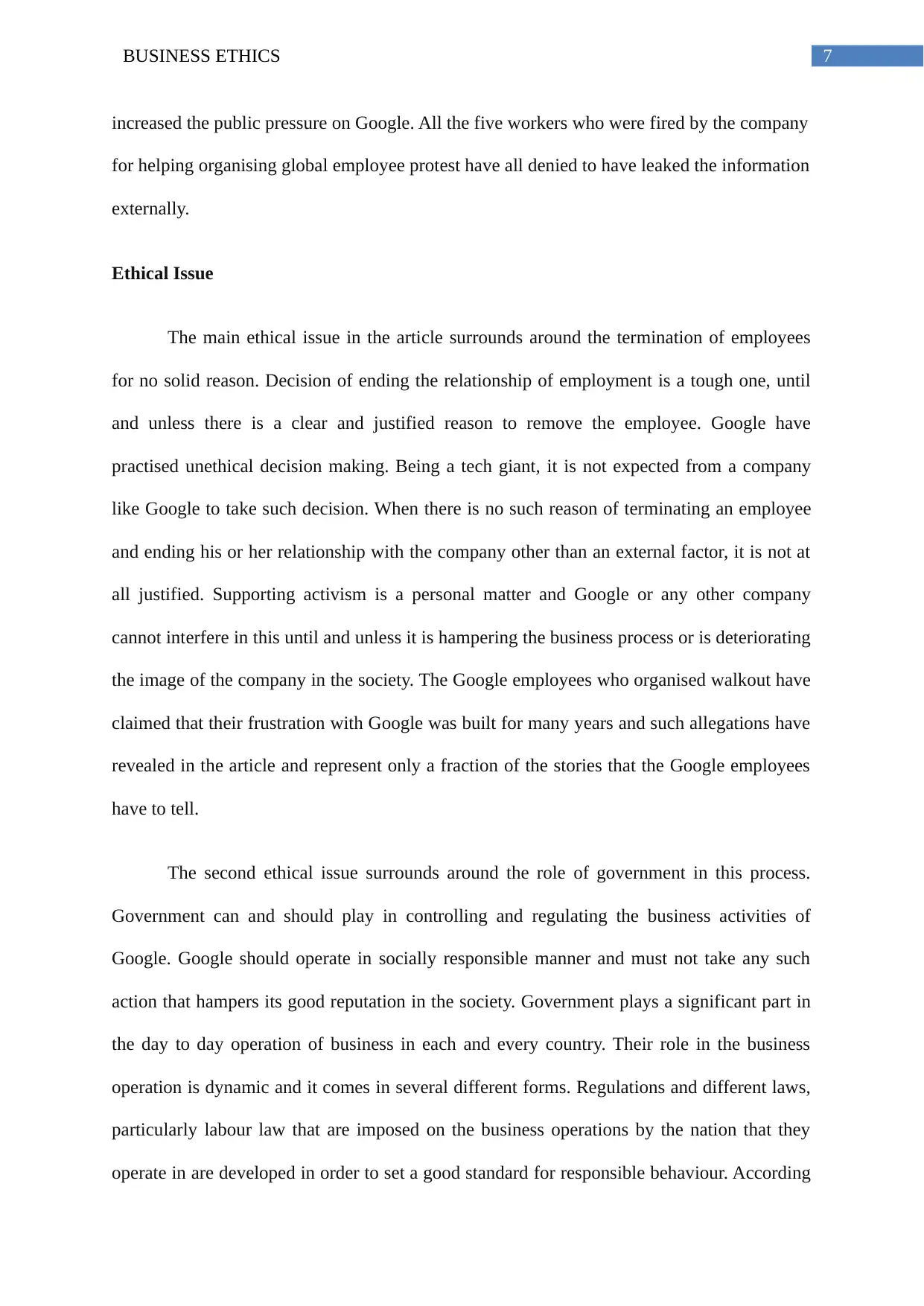
7BUSINESS ETHICS
increased the public pressure on Google. All the five workers who were fired by the company
for helping organising global employee protest have all denied to have leaked the information
externally.
Ethical Issue
The main ethical issue in the article surrounds around the termination of employees
for no solid reason. Decision of ending the relationship of employment is a tough one, until
and unless there is a clear and justified reason to remove the employee. Google have
practised unethical decision making. Being a tech giant, it is not expected from a company
like Google to take such decision. When there is no such reason of terminating an employee
and ending his or her relationship with the company other than an external factor, it is not at
all justified. Supporting activism is a personal matter and Google or any other company
cannot interfere in this until and unless it is hampering the business process or is deteriorating
the image of the company in the society. The Google employees who organised walkout have
claimed that their frustration with Google was built for many years and such allegations have
revealed in the article and represent only a fraction of the stories that the Google employees
have to tell.
The second ethical issue surrounds around the role of government in this process.
Government can and should play in controlling and regulating the business activities of
Google. Google should operate in socially responsible manner and must not take any such
action that hampers its good reputation in the society. Government plays a significant part in
the day to day operation of business in each and every country. Their role in the business
operation is dynamic and it comes in several different forms. Regulations and different laws,
particularly labour law that are imposed on the business operations by the nation that they
operate in are developed in order to set a good standard for responsible behaviour. According
increased the public pressure on Google. All the five workers who were fired by the company
for helping organising global employee protest have all denied to have leaked the information
externally.
Ethical Issue
The main ethical issue in the article surrounds around the termination of employees
for no solid reason. Decision of ending the relationship of employment is a tough one, until
and unless there is a clear and justified reason to remove the employee. Google have
practised unethical decision making. Being a tech giant, it is not expected from a company
like Google to take such decision. When there is no such reason of terminating an employee
and ending his or her relationship with the company other than an external factor, it is not at
all justified. Supporting activism is a personal matter and Google or any other company
cannot interfere in this until and unless it is hampering the business process or is deteriorating
the image of the company in the society. The Google employees who organised walkout have
claimed that their frustration with Google was built for many years and such allegations have
revealed in the article and represent only a fraction of the stories that the Google employees
have to tell.
The second ethical issue surrounds around the role of government in this process.
Government can and should play in controlling and regulating the business activities of
Google. Google should operate in socially responsible manner and must not take any such
action that hampers its good reputation in the society. Government plays a significant part in
the day to day operation of business in each and every country. Their role in the business
operation is dynamic and it comes in several different forms. Regulations and different laws,
particularly labour law that are imposed on the business operations by the nation that they
operate in are developed in order to set a good standard for responsible behaviour. According
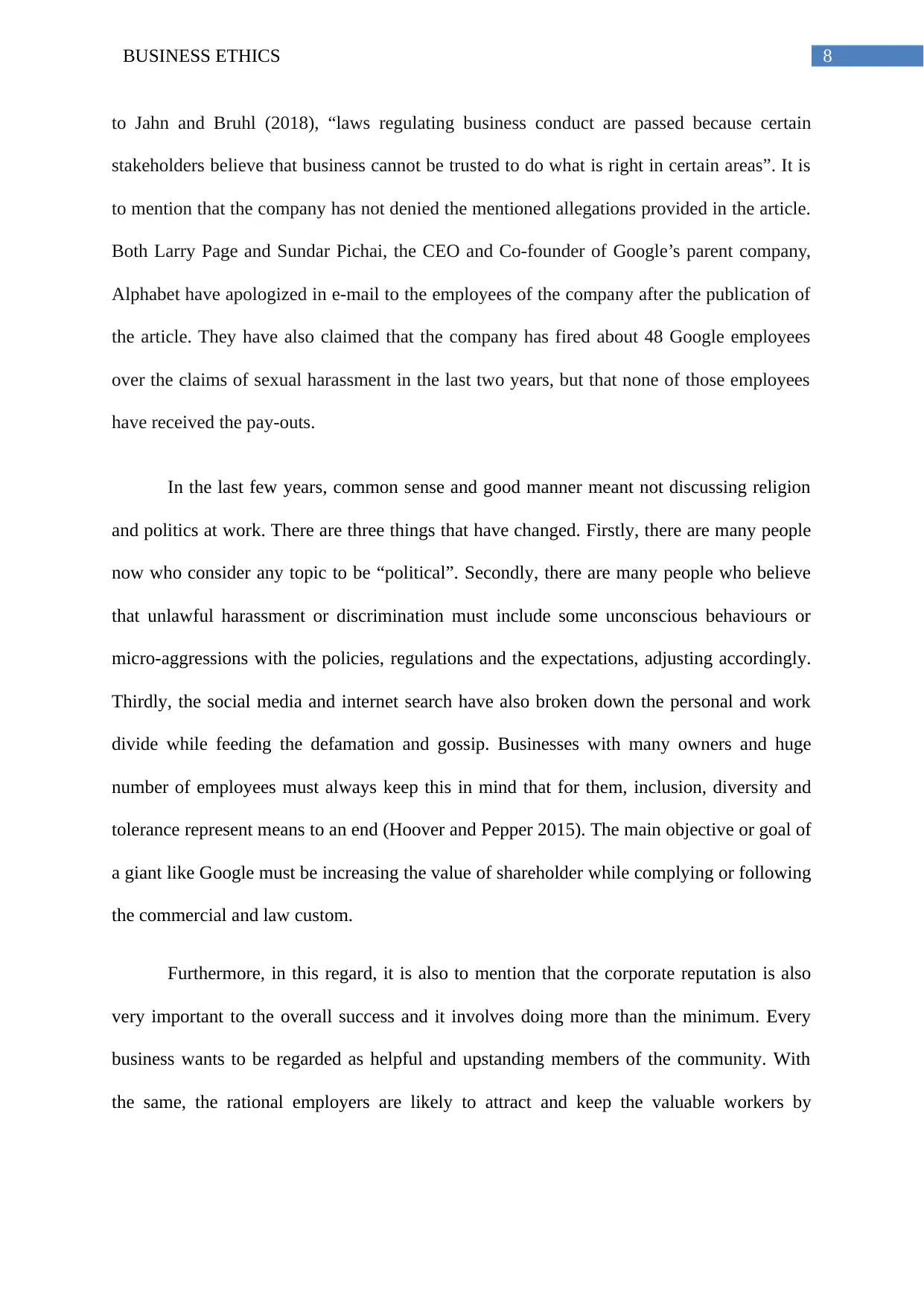
8BUSINESS ETHICS
to Jahn and Bruhl (2018), “laws regulating business conduct are passed because certain
stakeholders believe that business cannot be trusted to do what is right in certain areas”. It is
to mention that the company has not denied the mentioned allegations provided in the article.
Both Larry Page and Sundar Pichai, the CEO and Co-founder of Google’s parent company,
Alphabet have apologized in e-mail to the employees of the company after the publication of
the article. They have also claimed that the company has fired about 48 Google employees
over the claims of sexual harassment in the last two years, but that none of those employees
have received the pay-outs.
In the last few years, common sense and good manner meant not discussing religion
and politics at work. There are three things that have changed. Firstly, there are many people
now who consider any topic to be “political”. Secondly, there are many people who believe
that unlawful harassment or discrimination must include some unconscious behaviours or
micro-aggressions with the policies, regulations and the expectations, adjusting accordingly.
Thirdly, the social media and internet search have also broken down the personal and work
divide while feeding the defamation and gossip. Businesses with many owners and huge
number of employees must always keep this in mind that for them, inclusion, diversity and
tolerance represent means to an end (Hoover and Pepper 2015). The main objective or goal of
a giant like Google must be increasing the value of shareholder while complying or following
the commercial and law custom.
Furthermore, in this regard, it is also to mention that the corporate reputation is also
very important to the overall success and it involves doing more than the minimum. Every
business wants to be regarded as helpful and upstanding members of the community. With
the same, the rational employers are likely to attract and keep the valuable workers by
to Jahn and Bruhl (2018), “laws regulating business conduct are passed because certain
stakeholders believe that business cannot be trusted to do what is right in certain areas”. It is
to mention that the company has not denied the mentioned allegations provided in the article.
Both Larry Page and Sundar Pichai, the CEO and Co-founder of Google’s parent company,
Alphabet have apologized in e-mail to the employees of the company after the publication of
the article. They have also claimed that the company has fired about 48 Google employees
over the claims of sexual harassment in the last two years, but that none of those employees
have received the pay-outs.
In the last few years, common sense and good manner meant not discussing religion
and politics at work. There are three things that have changed. Firstly, there are many people
now who consider any topic to be “political”. Secondly, there are many people who believe
that unlawful harassment or discrimination must include some unconscious behaviours or
micro-aggressions with the policies, regulations and the expectations, adjusting accordingly.
Thirdly, the social media and internet search have also broken down the personal and work
divide while feeding the defamation and gossip. Businesses with many owners and huge
number of employees must always keep this in mind that for them, inclusion, diversity and
tolerance represent means to an end (Hoover and Pepper 2015). The main objective or goal of
a giant like Google must be increasing the value of shareholder while complying or following
the commercial and law custom.
Furthermore, in this regard, it is also to mention that the corporate reputation is also
very important to the overall success and it involves doing more than the minimum. Every
business wants to be regarded as helpful and upstanding members of the community. With
the same, the rational employers are likely to attract and keep the valuable workers by
⊘ This is a preview!⊘
Do you want full access?
Subscribe today to unlock all pages.

Trusted by 1+ million students worldwide
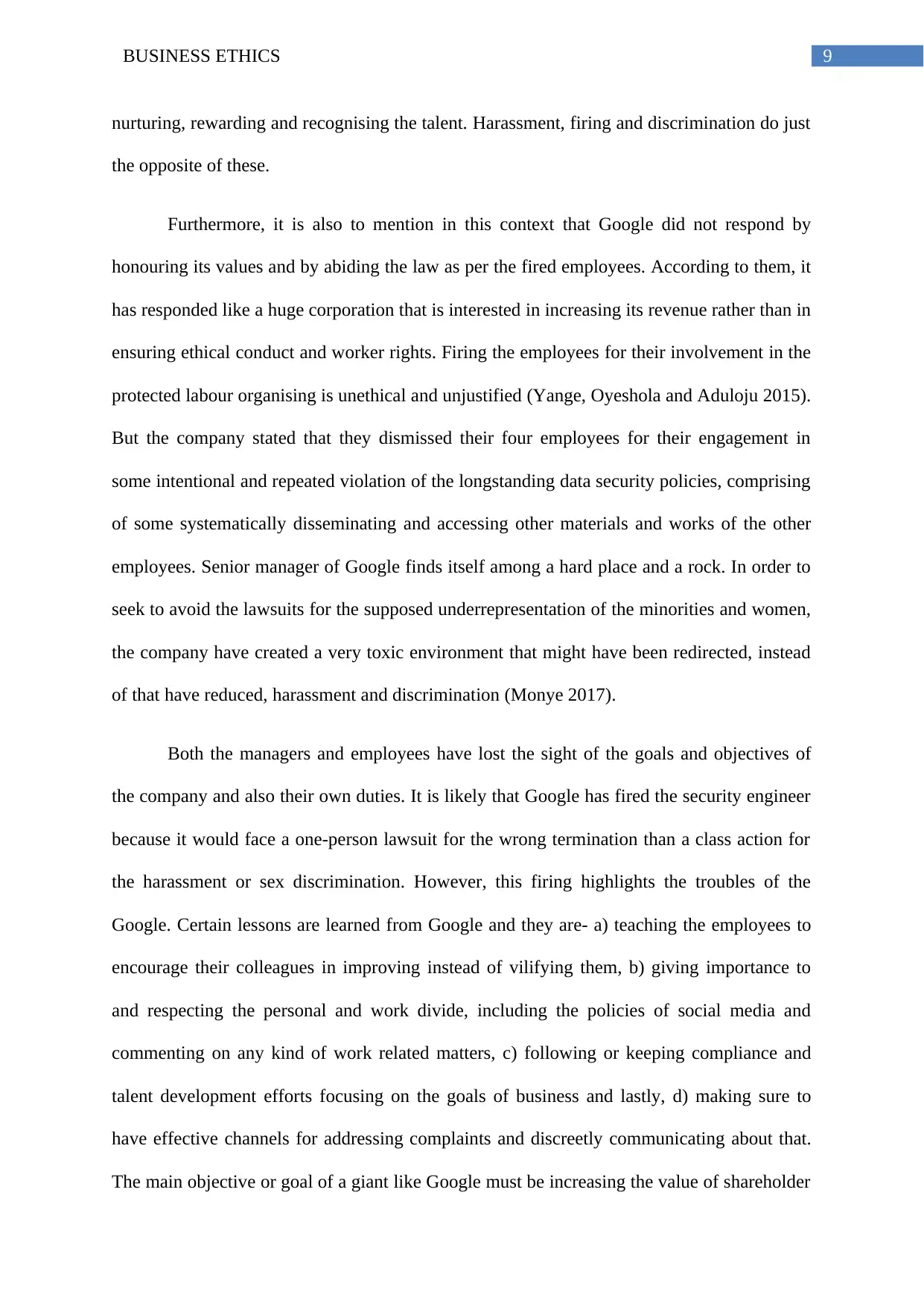
9BUSINESS ETHICS
nurturing, rewarding and recognising the talent. Harassment, firing and discrimination do just
the opposite of these.
Furthermore, it is also to mention in this context that Google did not respond by
honouring its values and by abiding the law as per the fired employees. According to them, it
has responded like a huge corporation that is interested in increasing its revenue rather than in
ensuring ethical conduct and worker rights. Firing the employees for their involvement in the
protected labour organising is unethical and unjustified (Yange, Oyeshola and Aduloju 2015).
But the company stated that they dismissed their four employees for their engagement in
some intentional and repeated violation of the longstanding data security policies, comprising
of some systematically disseminating and accessing other materials and works of the other
employees. Senior manager of Google finds itself among a hard place and a rock. In order to
seek to avoid the lawsuits for the supposed underrepresentation of the minorities and women,
the company have created a very toxic environment that might have been redirected, instead
of that have reduced, harassment and discrimination (Monye 2017).
Both the managers and employees have lost the sight of the goals and objectives of
the company and also their own duties. It is likely that Google has fired the security engineer
because it would face a one-person lawsuit for the wrong termination than a class action for
the harassment or sex discrimination. However, this firing highlights the troubles of the
Google. Certain lessons are learned from Google and they are- a) teaching the employees to
encourage their colleagues in improving instead of vilifying them, b) giving importance to
and respecting the personal and work divide, including the policies of social media and
commenting on any kind of work related matters, c) following or keeping compliance and
talent development efforts focusing on the goals of business and lastly, d) making sure to
have effective channels for addressing complaints and discreetly communicating about that.
The main objective or goal of a giant like Google must be increasing the value of shareholder
nurturing, rewarding and recognising the talent. Harassment, firing and discrimination do just
the opposite of these.
Furthermore, it is also to mention in this context that Google did not respond by
honouring its values and by abiding the law as per the fired employees. According to them, it
has responded like a huge corporation that is interested in increasing its revenue rather than in
ensuring ethical conduct and worker rights. Firing the employees for their involvement in the
protected labour organising is unethical and unjustified (Yange, Oyeshola and Aduloju 2015).
But the company stated that they dismissed their four employees for their engagement in
some intentional and repeated violation of the longstanding data security policies, comprising
of some systematically disseminating and accessing other materials and works of the other
employees. Senior manager of Google finds itself among a hard place and a rock. In order to
seek to avoid the lawsuits for the supposed underrepresentation of the minorities and women,
the company have created a very toxic environment that might have been redirected, instead
of that have reduced, harassment and discrimination (Monye 2017).
Both the managers and employees have lost the sight of the goals and objectives of
the company and also their own duties. It is likely that Google has fired the security engineer
because it would face a one-person lawsuit for the wrong termination than a class action for
the harassment or sex discrimination. However, this firing highlights the troubles of the
Google. Certain lessons are learned from Google and they are- a) teaching the employees to
encourage their colleagues in improving instead of vilifying them, b) giving importance to
and respecting the personal and work divide, including the policies of social media and
commenting on any kind of work related matters, c) following or keeping compliance and
talent development efforts focusing on the goals of business and lastly, d) making sure to
have effective channels for addressing complaints and discreetly communicating about that.
The main objective or goal of a giant like Google must be increasing the value of shareholder
Paraphrase This Document
Need a fresh take? Get an instant paraphrase of this document with our AI Paraphraser
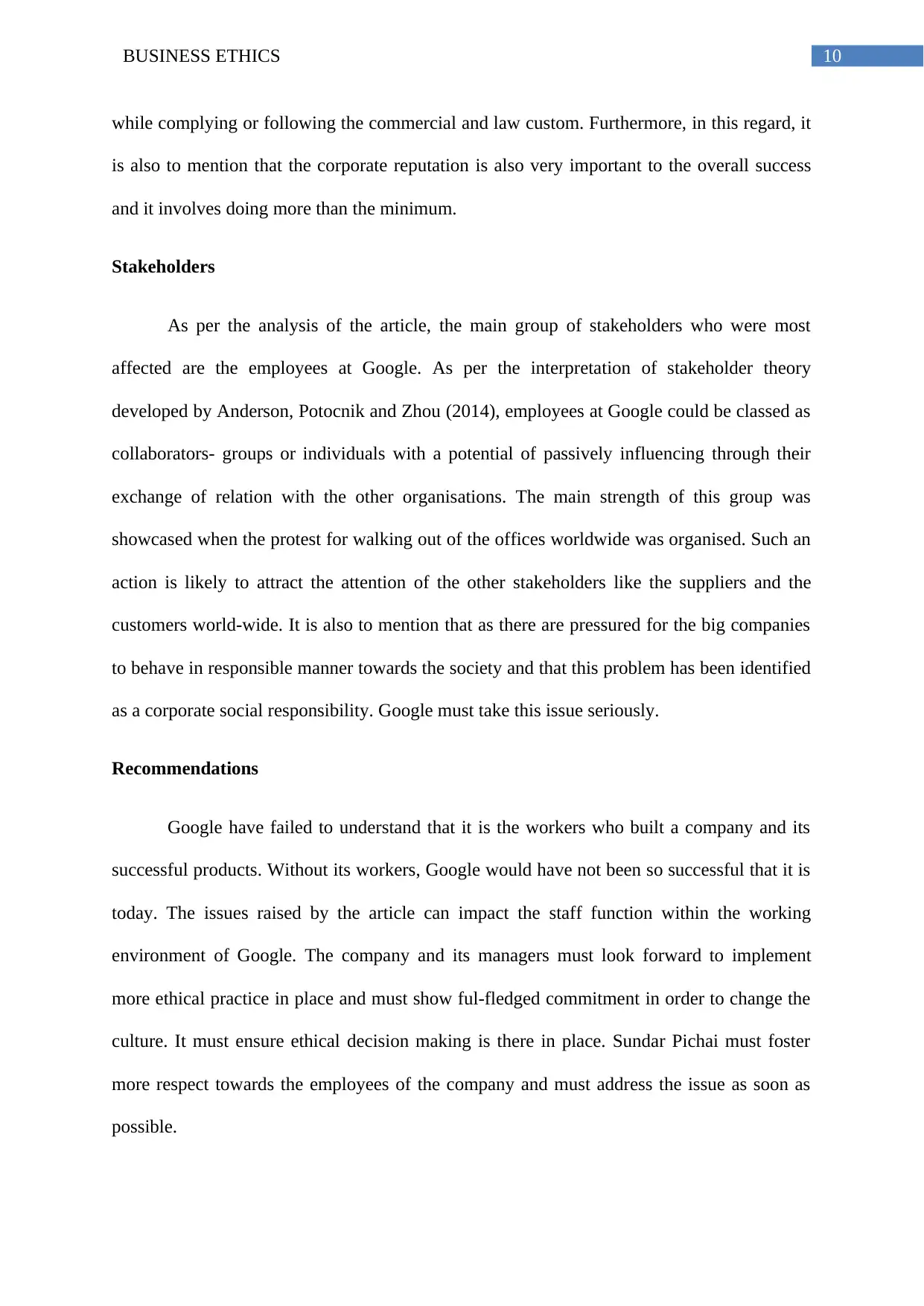
10BUSINESS ETHICS
while complying or following the commercial and law custom. Furthermore, in this regard, it
is also to mention that the corporate reputation is also very important to the overall success
and it involves doing more than the minimum.
Stakeholders
As per the analysis of the article, the main group of stakeholders who were most
affected are the employees at Google. As per the interpretation of stakeholder theory
developed by Anderson, Potocnik and Zhou (2014), employees at Google could be classed as
collaborators- groups or individuals with a potential of passively influencing through their
exchange of relation with the other organisations. The main strength of this group was
showcased when the protest for walking out of the offices worldwide was organised. Such an
action is likely to attract the attention of the other stakeholders like the suppliers and the
customers world-wide. It is also to mention that as there are pressured for the big companies
to behave in responsible manner towards the society and that this problem has been identified
as a corporate social responsibility. Google must take this issue seriously.
Recommendations
Google have failed to understand that it is the workers who built a company and its
successful products. Without its workers, Google would have not been so successful that it is
today. The issues raised by the article can impact the staff function within the working
environment of Google. The company and its managers must look forward to implement
more ethical practice in place and must show ful-fledged commitment in order to change the
culture. It must ensure ethical decision making is there in place. Sundar Pichai must foster
more respect towards the employees of the company and must address the issue as soon as
possible.
while complying or following the commercial and law custom. Furthermore, in this regard, it
is also to mention that the corporate reputation is also very important to the overall success
and it involves doing more than the minimum.
Stakeholders
As per the analysis of the article, the main group of stakeholders who were most
affected are the employees at Google. As per the interpretation of stakeholder theory
developed by Anderson, Potocnik and Zhou (2014), employees at Google could be classed as
collaborators- groups or individuals with a potential of passively influencing through their
exchange of relation with the other organisations. The main strength of this group was
showcased when the protest for walking out of the offices worldwide was organised. Such an
action is likely to attract the attention of the other stakeholders like the suppliers and the
customers world-wide. It is also to mention that as there are pressured for the big companies
to behave in responsible manner towards the society and that this problem has been identified
as a corporate social responsibility. Google must take this issue seriously.
Recommendations
Google have failed to understand that it is the workers who built a company and its
successful products. Without its workers, Google would have not been so successful that it is
today. The issues raised by the article can impact the staff function within the working
environment of Google. The company and its managers must look forward to implement
more ethical practice in place and must show ful-fledged commitment in order to change the
culture. It must ensure ethical decision making is there in place. Sundar Pichai must foster
more respect towards the employees of the company and must address the issue as soon as
possible.
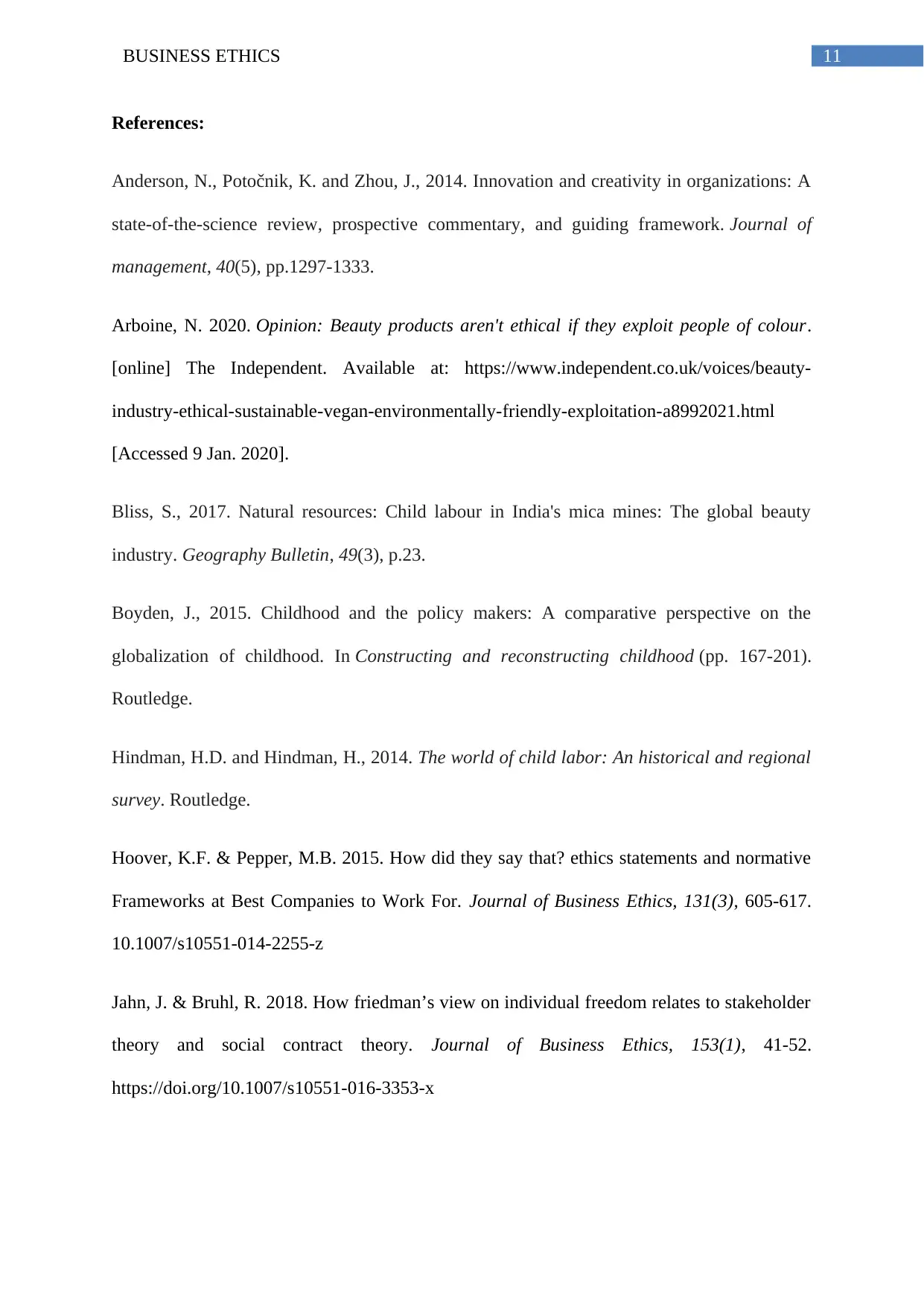
11BUSINESS ETHICS
References:
Anderson, N., Potočnik, K. and Zhou, J., 2014. Innovation and creativity in organizations: A
state-of-the-science review, prospective commentary, and guiding framework. Journal of
management, 40(5), pp.1297-1333.
Arboine, N. 2020. Opinion: Beauty products aren't ethical if they exploit people of colour.
[online] The Independent. Available at: https://www.independent.co.uk/voices/beauty-
industry-ethical-sustainable-vegan-environmentally-friendly-exploitation-a8992021.html
[Accessed 9 Jan. 2020].
Bliss, S., 2017. Natural resources: Child labour in India's mica mines: The global beauty
industry. Geography Bulletin, 49(3), p.23.
Boyden, J., 2015. Childhood and the policy makers: A comparative perspective on the
globalization of childhood. In Constructing and reconstructing childhood (pp. 167-201).
Routledge.
Hindman, H.D. and Hindman, H., 2014. The world of child labor: An historical and regional
survey. Routledge.
Hoover, K.F. & Pepper, M.B. 2015. How did they say that? ethics statements and normative
Frameworks at Best Companies to Work For. Journal of Business Ethics, 131(3), 605-617.
10.1007/s10551-014-2255-z
Jahn, J. & Bruhl, R. 2018. How friedman’s view on individual freedom relates to stakeholder
theory and social contract theory. Journal of Business Ethics, 153(1), 41-52.
https://doi.org/10.1007/s10551-016-3353-x
References:
Anderson, N., Potočnik, K. and Zhou, J., 2014. Innovation and creativity in organizations: A
state-of-the-science review, prospective commentary, and guiding framework. Journal of
management, 40(5), pp.1297-1333.
Arboine, N. 2020. Opinion: Beauty products aren't ethical if they exploit people of colour.
[online] The Independent. Available at: https://www.independent.co.uk/voices/beauty-
industry-ethical-sustainable-vegan-environmentally-friendly-exploitation-a8992021.html
[Accessed 9 Jan. 2020].
Bliss, S., 2017. Natural resources: Child labour in India's mica mines: The global beauty
industry. Geography Bulletin, 49(3), p.23.
Boyden, J., 2015. Childhood and the policy makers: A comparative perspective on the
globalization of childhood. In Constructing and reconstructing childhood (pp. 167-201).
Routledge.
Hindman, H.D. and Hindman, H., 2014. The world of child labor: An historical and regional
survey. Routledge.
Hoover, K.F. & Pepper, M.B. 2015. How did they say that? ethics statements and normative
Frameworks at Best Companies to Work For. Journal of Business Ethics, 131(3), 605-617.
10.1007/s10551-014-2255-z
Jahn, J. & Bruhl, R. 2018. How friedman’s view on individual freedom relates to stakeholder
theory and social contract theory. Journal of Business Ethics, 153(1), 41-52.
https://doi.org/10.1007/s10551-016-3353-x
⊘ This is a preview!⊘
Do you want full access?
Subscribe today to unlock all pages.

Trusted by 1+ million students worldwide
1 out of 22
Your All-in-One AI-Powered Toolkit for Academic Success.
+13062052269
info@desklib.com
Available 24*7 on WhatsApp / Email
![[object Object]](/_next/static/media/star-bottom.7253800d.svg)
Unlock your academic potential
Copyright © 2020–2026 A2Z Services. All Rights Reserved. Developed and managed by ZUCOL.